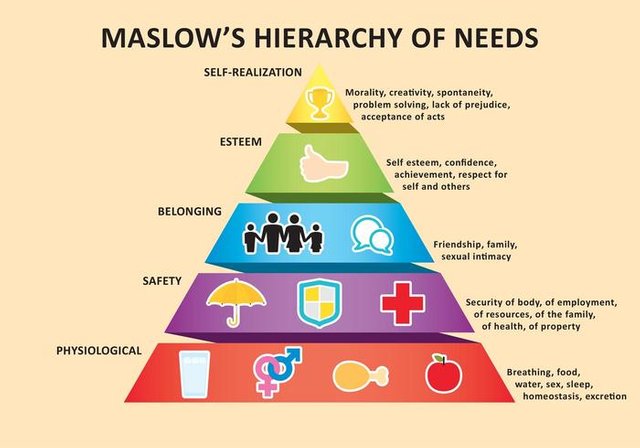Self Actualization! p2

Now, Maslow believed that in order to attain a higher level in the actualization hierarchy, you must first have attained and secured all the previous levels.
This is where he and I disagree.
You see, my father grew up in abject poverty, in rural Panama. He was the fifth in a family of six unruly kids living in a single parent household, (or rather bungalow) in a third world county.
That’s about as poor as it gets.

And yet his family and community shared a remarkable bond because they were all destitute. They struggled and survived together, even though there often wasn’t enough to eat. It’s my understanding that he and his family occupied the third level of human needs, even though the first two levels were shaky at best, and nonexistent at worst.
I believe that one can have higher levels of attainment in the pyramid while lacking others. In fact, I think that to attain the higher two levels it’s almost necessary that you forgo satisfaction on at least one of the lower levels for at least some period of time.

Take for instance the young corporate executive. She’s tough, goal oriented, and driven by ambitions of becoming a CEO. Do you think she has time to raise kids or start a family, or even pursue a satisfying, meaningful relationship? Not in her chosen profession, at least not for a while. Those who choose to climb the corporate ladder have and incredibly arduous road ahead of them, working 70-80 hour weeks, and sleeping 5 hours a night. This kind of schedule leaves hardly enough time for a coffee break, let alone a family. There are no more late nights partying with friends, casual flings, or spontaneous vacations anymore. Not for a long time. On average it takes someone about 25 years of experience in order to reach this level in a large company. In that time, she’ll have given up major bits of the third level of satisfaction, for a significant portion of her life.
The fifth level, while in many cases can be glimpsed or even achieved at an early age, may take an entire lifetime to be fully realized. Even so, most people move through their entire lives without even conceiving of a higher level of inner satisfaction, let alone finding.
The Dilemma of Self-Actualization
The fifth level of the hierarchy is by far the most fulfilling, but it’s also a double-edged sword. In order to pursue Self -Actualization we may have to abandon some or even all of our attachments to the lower levels, at least temporarily. This is because Self Actualization isn’t really the fifth level in the hierarchy, it actually moves beyond it.
“Can you furnish yourself with your own good and evil and hang up your own will above yourself as law? Can you be judge of yourself and avenger of your law?” -Nietzsche

Put in slightly more digestible terms it reads, “Can you define and live by your own code, and prioritize your own good as chief among the pressures of society?”
The Self-Actualized person is one who has become their own compass, their own beacon, whose destiny, and quality of life are dictated by their standards, and theirs alone.
Chances are you too have an internal code, an inner voice, a compass that desires nothing more than to steer you in the direction of your highest good.
I call that voice ‘‘Truth’’.
The more you learn to listen and follow that inner voice the closer you move towards Self -Actualization.
“Your time is limited, so don't waste it living someone else's life. Don't be trapped by dogma - which is living with the results of other people's thinking. Don't let the noise of others' opinions drown out your own inner voice.” - Steve Jobs
Conversely, the more you deny and ignore it, the more unnecessarily complicated and miserable your life becomes.
Now we’ll skip back to Thoreau’s words to see if they relate at a much deeper level. When we repress our own voice and choose to instead to follow external influences, a deep sense of injustice sets in. We start to feel the “quiet desperation” of a life not fully lived, a song not fully sung. But the injustice isn’t the world’s fault. It’s our own.
We know we’re not doing right by ourselves, we know we ought to get out and live more fully and bravely, and we know the clock is ticking, and that life is quickly passing us by. And yet we can’t help but cling to external voices, because those voices belong to our friends, family, and colleagues, and what frightens many the most is feeling alone. So, we put ourselves last in the game of life, hoping that one day we’ll have the courage to stand up, love ourselves, and in spite of what anyone might say, live a truly fulfilled life.
This tragic self-denial is far too common in today’s world, and I aim to do my utmost to eradicate it, both within and without.
Not only is this kind of ‘half life’ painful, it’s deeply dishonest.
Far too often we settle for less, and feign contentment with a career, marriage, or life we aren’t truly satisfied with because we’ve built our very lives around the notion that we are. We’re too afraid to let go of the mess we’ve made, even if it makes us unhappy, and that only makes things worse. It’s a deception, a farce. Not necessarily a spoken lie, but a lived one.
And the worst thing we can do to ourselves is to live out a lie.
This sort of ‘life lie’ is the root of neurosis according to Alfred Adler. In fact, all of modern psychology is in agreement on this fact, albeit with different terminology. Freud for instance dubbed this phenomena repression. Jung believed psychotherapy could be avoided altogether by a ‘supreme moral effort’ namely, to live completely true to oneself.
